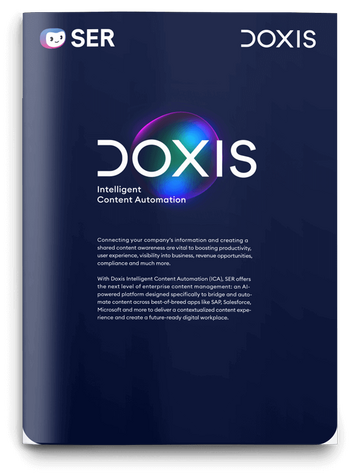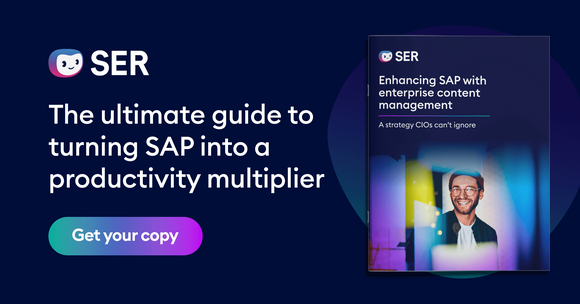SER Blog Customer Stories & Use Cases
The best way to create and manage different contract types
Contracts are the backbone of your business relationships—with suppliers, customers, and employees alike. A well-structured contract ensures clarity, minimises risk, and strengthens enforceability in professional settings. Managing contracts digitally is the smartest way to stay in control, especially when handling multiple contract types across your organisation.

What is a contract?
Contracts are formal agreements between two or more parties that define their obligations. If one party fails to meet these obligations, the other can legally enforce the contract or seek compensation.
- Written contracts are formal agreements signed by all parties, making them one of the most enforceable contract types.
- Oral contracts are binding in English law, but they are difficult to prove in court, which makes them harder to enforce when disputes arise.
- Implied contracts arise from actions or conduct rather than written or spoken agreements—for example, ordering a meal at a restaurant creates an implied contract to pay for the food served.
- Standard form contracts are pre-drafted agreements presented on a ‘take it or leave it’ basis, with little room for negotiation. Common examples include insurance policies and the terms and conditions for online subscriptions or information services.
- Electronic contracts are created and executed digitally, often via email, websites, or online forms. They are signed using e-signatures and must comply with the legal requirements outlined in the Electronic Communications Act 2000 and eIDAS regulations to be legally binding.
Digital contracts
In England, digital contracts are legally valid and enforceable, provided they meet the general requirements of all contracts. This means they should be offered, accepted and executed, as well as relating to something that is of lawful value. However, additional legal frameworks apply when using digital contracts, including:
- The Electronic Communications Act, which specifies how e-signatures should be created to be legally valid.
- eIDAS is an EU regulation that applies to cross-border transactions and requires that e-signatures and digital contracts meet specific standards.
- The Consumer Contracts Regulations 2013 set out the rules for contracts between businesses and consumers. In the case of digital contracts, businesses trading in England and Wales are required to provide certain information to consumers along with the right to cancel contracts made online for up to 14 days.
Different forms of contract in England
English contract law is complex and mostly subject to common law, so there isn’t a clear set of written legislation. However, there are some general rules about what form a contract can take and what makes a contract legally enforceable.
What are the main contract types?
Contracts in England and Wales (Scotland and Northern Ireland are separate legal jurisdictions) are largely governed by common law. This framework allows for a wide variety of contract types, but the most commonly used by businesses operating here include:
- Employment contracts
A work contract defines the terms of the relationship between an employee and their employer. It typically outlines responsibilities, salary, working hours, and benefits. A well-structured contract should also include clear provisions on notice periods and termination to minimize the risk of disputes. - Sales contracts
One of the most commonly used business contracts is a sales contract, which sets out the terms of a sale, including price, deadlines, delivery conditions, and warranties. - Supplier agreements
The counterpart to a sales contract is a supplier agreement, which defines similar terms but applies to goods or services your business receives rather than provides. - Service contracts
This work contract defines the terms for buying or selling services like marketing, design, or consulting. It should clearly outline the scope of work, payment terms, and key deadlines or project milestones. - Non-disclosure agreements (NDAs)
These contracts protect sensitive business information from being disclosed, covering trade secrets, future business strategies, or other confidential data. They are closely related to confidentiality agreements, which serve a similar purpose. - Lease agreements
A lease is a contract between a business and a landlord that sets out the terms for renting commercial property. It typically includes rent amount, lease duration, and responsibility for costs like repairs and taxes. A well-structured lease covers rent reviews, break clauses, and renewal options. - Loan agreements
If your business takes out a loan, the loan agreement serves as a contract detailing the borrowed amount, repayment schedule, interest rate, and any restrictions on fund usage. - Shareholder agreements
This type of contract defines the rights and responsibilities of a business's owners. It should also outline procedures for issuing new shares and include provisions for resolving potential ownership disputes. - Consumer contracts
A consumer contract is one of the most common types of work contracts in England and Wales. It governs the sale of goods or services from a business to a consumer rather than another business. These contracts often need to comply with consumer protection laws and should clearly outline key terms, such as the customer’s right to return goods and the business’s warranty or refund policy. - Licensing contracts
A licensing contract grants an individual or business permission to use intellectual property (IP) for a specific purpose—such as producing a toy based on a character or creating clothing featuring a logo. These agreements outline how the IP can be used, including restrictions on location, duration, and any other relevant terms. - Joint venture agreements
A collaboration agreement is a contract between two or more parties to work together on a project, sharing both risks and rewards. It defines each party’s obligations and responsibilities while also specifying how profits, investments, and resources will be allocated.

Doxis Contract Management
Read all about how to steer, transparently manage and demonstrably protect all contracts across your entire company — with Doxis.
Read nowSetting up contracts digitally: step by step
Drafting contracts from scratch is time-consuming and error-prone. Contract templates in a DMS like Doxis speed up the process and align with your company’s legal standards. Let’s briefly look at how easy it is work with all contract types in Doxis.
Step 1: Create a contract template
Start by identifying recurring contract types in your company and create templates for them. Each template includes a query form with key details like term, notice period, remuneration, and parties involved.
Tip: Save time and avoid error by using text module software to build contracts from pre-approved text blocks.
Step 2: Select the right contract type and enter the information
Next, choose the relevant contract type from your saved templates and fill in the query form: a supplier contract might include details on services, responsible parties, and duration, for instance.
Step 3: Fill out the contract template
Once that’s done, select the appropriate template, for example a supplier or vehicle order contract. Let Doxis auto-generate the contract accurately, watching as it fills in all the right placeholders, names it, and then stores it as a digital contract file.
Step 4: Review and assess risk
Your legal team should always review the contract for accuracy and completeness, so use Doxis workflow to trigger this step automatically. Risk is assessed using predefined metrics, with tasks created for further analysis if needed.
Step 5: Sign digitally
After legal review, you’re good to go, and so initiate the in-built Doxis digital signature process. What that looks like is that all you have to do is assign a task to the signatory, enter their email, and the system sends a signing request. In milliseconds, the signed contract with the right timestamp appears in the contract file.
Using digital control to optimise your types of work contracts processes
There’s a lot to manage when it comes to contracts, and businesses need structure and clear oversight to stay in control.
Doxis proven contract management provides a streamlined approach to creating, reviewing, editing, and archiving contracts—all within your organisation. Digitising these processes reduces paperwork, automates workflows, and cuts administrative costs, making contract management faster and more efficient.
Using an ECM system to optimise your contract management processes
Hey Doxi, can ECM optimise contract management?
A digital contract library simplifies storage, search, and retrieval, preventing bottlenecks as your business scales, while leveraging pre-built templates for common contract types speeds up creation and ensures compliance with industry and legal standards. Here, Doxis’s fully customisable templates for template management help tailor contracts to your exact needs.
Seamless integration
Doxis also seamlessly integrates with all the main e-signature tools like DocuSign and Adobe Sign, ensuring a smooth, connected contract workflow. With Doxis you can manage all the contract types your organisation will ever need to deal with 100 digitally, and so ensure they are always handled correctly, transparently, securely and accurately across the entire company.
With Doxis, contract files are only ever stored in a central, structured and audit-proof way, creating transparency throughout all types of work contracts. Regardless of whether you are creating, negotiating, processing or canceling a contract the entire life cycle is documented, and all company contract documents are readily available, regardless of location or time, but only ever to authorised employees.

Doxis Intelligent Content Automation
With Doxis Intelligent Content Automation SER offers the next level of enterprise content management.
Read nowWith Doxis, you can manage contract types digitally and efficiently with templates
As we’ve seen, different contract types have distinct requirements and use cases. Understanding these is key to creating templates that streamline workflows. The good news is that Smart document management systems like Doxis simplify, standardise, and fully digitise the full contract process from start to finish for you and your team.
So, partner with document management experts to optimise your types of work contracts workflow, and let Doxis make this one less thing to worry about.
The latest digitization trends, laws and guidelines, and helpful tips straight to your inbox: Subscribe to our newsletter.
How can we help you?
+49 (0) 30 498582-0Your message has reached us!
We appreciate your interest and will get back to you shortly.




